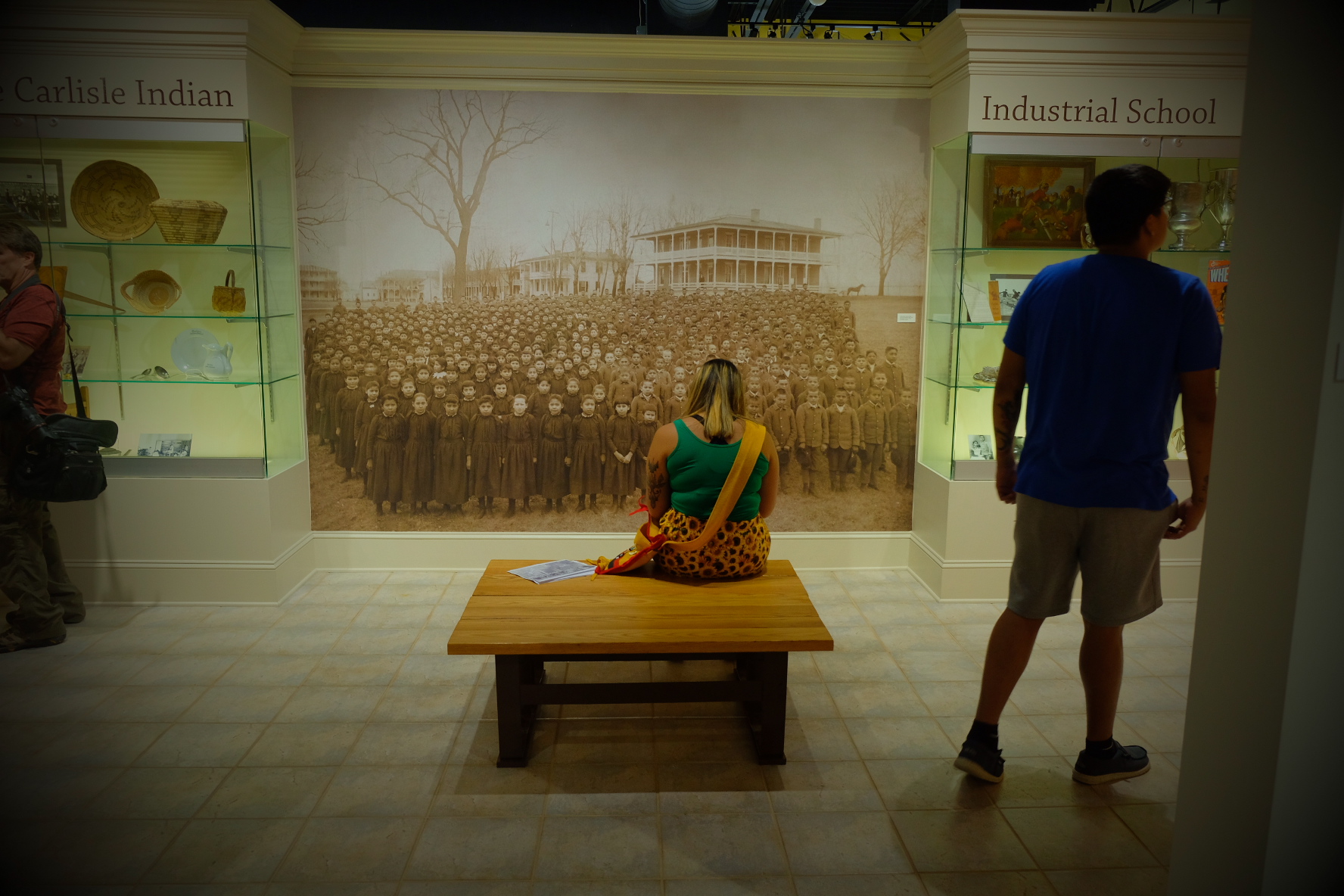
- Details
- By Jenna Kunze
- Native News Online Journalist Jenna Kunze is measuring the impacts of boarding school on the Rosebud Sicangu Oyate Reservation
- She’s working in partnership with tribal members and experts across Indian Country
- “This survey will help us better understand ourselves, as well as have better data on who and what we have been through,” said tribal member Christopher Eagle Bear.
- The results will be included in three articles, written by Kunze, to show non-Natives and policy makers the ripple effects caused by Indian Boarding Schools.
Dear Rosebud Tribal Member,
I’m Jenna Kunze, a reporter at Native News Online, an Indigenous-run news organization where I’ve covered stories impacting Native people for just over a year now. I’m writing to you to explain a project I’m working on that I’m asking you to consider participating in.
The project, co-designed with local tribal members and with weigh-in from experts across Indian Country, aims to create a snapshot on the impact Indian Boarding Schools have had on descendants of the boarding school era living on or near the Rosebud Sicangu Oyate Reservation today.
It’s not surprising that a 150 year federal policy that removed most Native children from their homes to be brought up by priests and nuns has done damage to the physical, mental and spiritual health of an entire population, for generations.
It is surprising that there’s little data connecting the two: the boarding school era and tribal members’ poor health outcomes today.
Native American children are more likely than nearly any other racial counterpart to suffer from: suicide, depression, alcoholism, and domestic violence. As a whole, Indigenous people are disproportionately impacted by heart disease, obesity, diabetes, and more. As a result, Covid has taken more Native Americans per population size than any other ethnic group in the country.
I’ve enlisted the help of several tribal members across all ages to design a survey. It will ask participants to answer 20 questions, all recorded anonymously, to identify basic background information on age, gender identity, tribal affiliation, education level, and how they relate to boarding school (i.e. if your parents went but you didn’t, you’re a descendant).
Half of the survey questions can be answered with just a yes or a no. They’re based on an established survey called the Adverse Childhood Experiences (ACE) Study. Adverse childhood experiences (ACEs) are potentially traumatic events that occur before a child reaches the age of 18. Such experiences can interfere with a person’s health, opportunities and stability throughout his or her lifetime—and can even affect future generations.
One tribal member told me that, in order to work towards healing, they must first identify what sort of trauma is there. This is one way to do that.
“This survey will help us better understand ourselves, as well as have better data on who and what we have been through,” said tribal member and Sicangu Youth Council member, Christopher Eagle Bear. The Sicangu Youth Council is a student-led organization on the reservation, created for youth to express their voices. Last summer, the council brought home nine Rosebud ancestors from where they died at the nation’s first boarding school in Pennsylvania. Christopher is one of the tribal members working with me to create and distribute the survey.
This survey aims to connect today’s health conditions on the reservation with the traumatic and cyclical history of Indian boarding schools. The reporting will also ask what healing means to you, if it’s necessary, and whose responsibility it is.
With the momentum of the Federal Indian Boarding School Initiative and the Sicangu Youth Councils’ recent success at Carlisle, many tribal members agree it's an appropriate time to do this work.
Who am I, am why am I doing this work
You might ask why I’ve selected Rosebud for the focus of this work. The answer is, because I already had relationships with tribal members. Over the summer, I traveled to Carlisle, Pennsylvania, to report on your tribe's return of nine of its ancestors.
At Carlisle, I met Sicangu Youth Council members, along with Ione Quigley, Russell Eagle Bear and former president Rodney Bordeaux.
 Months afterwards, when I had the opportunity to write a project proposal for the University of Southern California Annenberg’s 2021 data fellowship, I thought I’d go with what I know. I reached out to Christopher, and he agreed the project could be helpful to the work the Sicangu Youth Council has already been doing.
Months afterwards, when I had the opportunity to write a project proposal for the University of Southern California Annenberg’s 2021 data fellowship, I thought I’d go with what I know. I reached out to Christopher, and he agreed the project could be helpful to the work the Sicangu Youth Council has already been doing.
I got permission from the new Tribal President Scott Herman, and also enlisted the help of tribal council member Jordan Rahn to help connect me with schools where I could conduct the survey.
In November 2021, I came to Rosebud for the first time just to meet with people and discuss the possibility of the survey. Tribal Historic Preservation Officer Ione Quigley suggested I meet with LeToy Lunderman and Sunrise Black Bull, both of whom have been doing similar work for years.
Lunderman— a local advocate who has done extensive work educating tribal members on trauma response—said she feels “encouraged by the survey that was developed.”
“I am a mother, advocate, and can trace back 5 generations to the boarding school here on our reservation,” Lunderman said. “We have acknowledged the trauma of our past, now we start the hard work of healing and this survey will help us to do that.”
I also spent several mornings with Duane Hollow Horn Bear, listening to his own experiences and hearing about his immersive Lakota school. I met with tribal police chief Steve DeNoyer, and local prison warden, Melissa Eagle Bear. A group of high schoolers I met with told me that a survey such as this is needed to illuminate the impact of boarding schools and work towards healing.
When I flew back to my apartment in New York, I got in touch with Native professionals across Indian Country who have experience with survey work. Sandy White Hawk agreed to help me, as did Stephanie Big Crow and Preston McBride. They all gave me feedback and encouragement on the survey I began to construct.
Stephanie Big Crew, an Oglala Lakota who studies Indigenous data sovereignty, said she fully supports the survey.
“As an indigenous scholar we’ve had multiple non-native entities conduct research designed to understand the underlying multi-dimensional effects of intergenerational trauma impacting indigenous peoples mentally, physically and spiritually,” she said. “Initiating a broader survey designed in partnership with indigenous peoples will allow first-hand data to understand vital aspects of trauma and potentially engage in a broader sphere of research to ensure culturally mindful outcomes for the betterment of our people today and those unborn seven generations ahead.”
My next step in this project is to come out to Rosebud once again this February, Covid permitting. This time around, I’ll work with my contacts to distribute the survey (both paper copies and electronically), and educate participants on the work we’re doing.
Then, I’ll use that anonymous data to write three different stories for Native News Online. Those stories, which I’m aiming to publish by the end of March, will go live on the website, and potentially other non-Native news organizations, as well.
The point of the survey is not to pass judgment on Indigenous parenting, but rather connect present day realities with the history of boarding schools. Your survey participation helps show the present day impacts of boarding schools, and your cumulative answers will be put directly in front of government officials as to show them how a single government policy impacts an entire population 150 years later, and what’s needed to work towards healing. This project also serves as a way of educating non-Natives across the country on the experiences and ripple effects caused by Indian Boarding Schools.
"Boarding schools took so much, and yet we still don't know as much about them as we should,” said Preston McBride, a boarding school historian at the University of Southern California. “There is so much power in excavating the truths from the boarding school era in an effort to heal and to understand the continued impacts of the institutions. This survey and community-guided work will get us closer to the goals of healing and bringing the United States to account for this damaging federal policy."
As a non-Native myself, I recognize that this work is particularly sensitive to engage with. I also think it’s important and, if done correctly and with a lot of stakeholder input, is something that can be replicated by other tribal nations to seek justice and healing.
In the collective words of several mentors helping with this project, quantifying intergenerational trauma can help heal the past, explain the present, and better the future.
If you have any questions about my project or you’d like to get in touch to participate, please email me at [email protected].
Thank you.
Jenna Kunze
More Stories Like This
Native News Weekly (August 25, 2024): D.C. BriefsUS Presidents in Their Own Words Concerning American Indians
Flanagan Calls ICE Agents ‘out of control’ after Woman Killed in Minneapolis
American Indigenous Tourism Association Announces New Board Members
Deb Haaland Talks Youth, Jobs and Opportunity in Governor Bid
Help us defend tribal sovereignty.
At Native News Online, our mission is rooted in telling the stories that strengthen sovereignty and uplift Indigenous voices — not just at year’s end, but every single day.
Because of your generosity last year, we were able to keep our reporters on the ground in tribal communities, at national gatherings and in the halls of Congress — covering the issues that matter most to Indian Country: sovereignty, culture, education, health and economic opportunity.
That support sustained us through a tough year in 2025. Now, as we look to the year ahead, we need your help right now to ensure warrior journalism remains strong — reporting that defends tribal sovereignty, amplifies Native truth, and holds power accountable.
 The stakes couldn't be higher. Your support keeps Native voices heard, Native stories told and Native sovereignty defended.
The stakes couldn't be higher. Your support keeps Native voices heard, Native stories told and Native sovereignty defended.
Stand with Warrior Journalism today.
Levi Rickert (Potawatomi), Editor & Publisher

